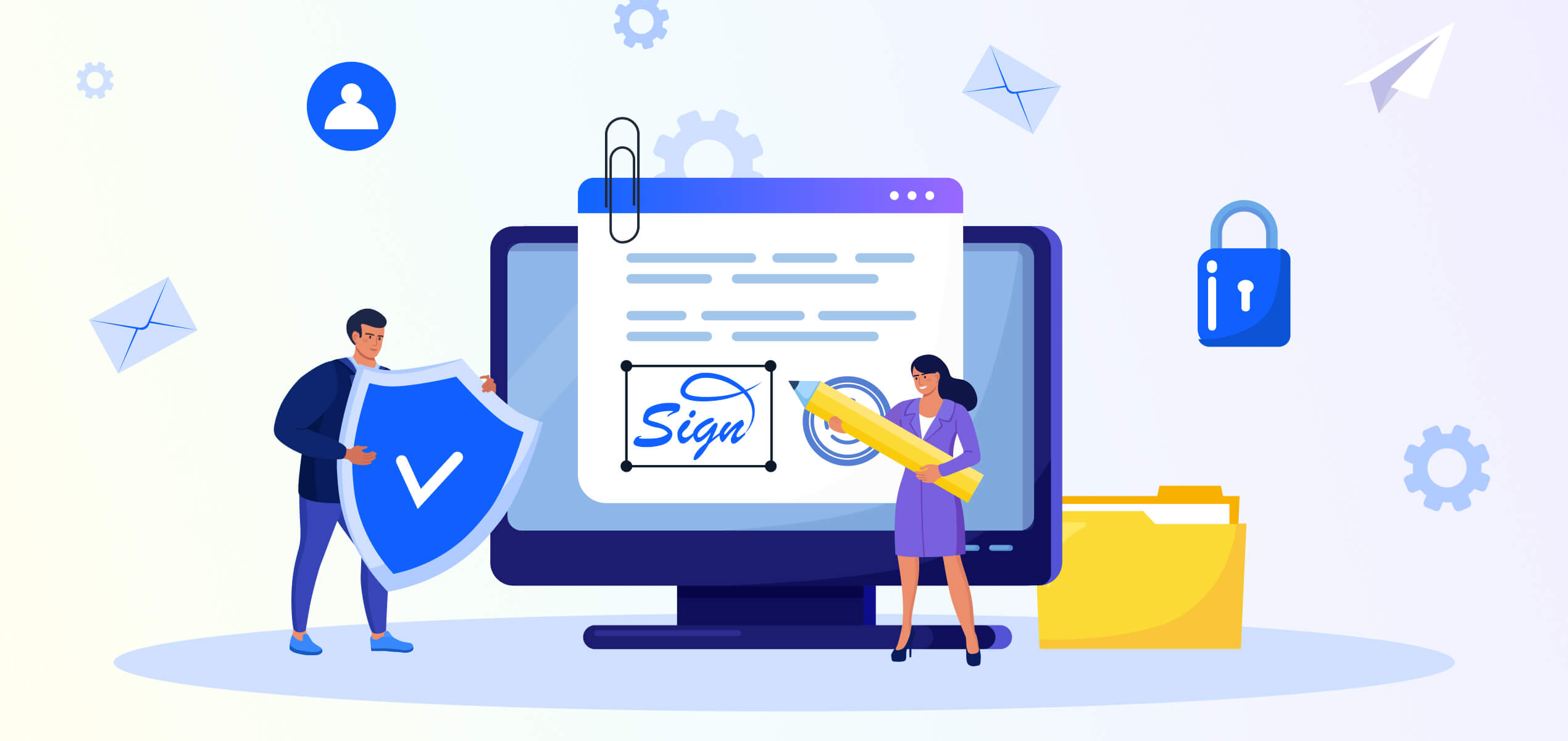In the legal industry, the importance of security, accuracy, and efficiency cannot be overstated.
As law firms and corporate legal departments deal with large volumes of contracts, client agreements, and other sensitive documents daily, the need for an efficient, secure, and legally binding method of signing documents is critical.
This is where digital signatures come in, offering a modern solution that simplifies contract validations, reduces paperwork, and ensures confidentiality. 89% of companies are already using legal-tech solutions including electronic signatures.
The adoption of digital signatures is transforming the way legal professionals manage client agreements and validate contracts. Would you like to find out why and how to implement digital signatures to your law firm? Let’s get started:
What Are Digital Signatures?
An electronic signature (eSignature) serves as a digital equivalent of a traditional handwritten signature. Unlike traditional signatures, eSignatures rely on secure technology to verify the identity of the signer and maintain the document’s integrity.
Key Legal Frameworks for eSignatures
The legality of eSignatures varies depending on specific regulations and standards that differ from one country to another. eSignatures are legally recognized worldwide through various frameworks:
- ESIGN Act (USA): Grants eSignatures the same validity as handwritten signatures, requiring clear intent, secure signing processes, consent, and document retention.
- eIDAS Regulation (EU): Establishes three signature levels: Simple (SES), Advanced (AES), and Qualified (QES), with QES being the most secure and equivalent to a handwritten signature.
- IT Act, 2000 (India): Governs digital signatures for government transactions. To be valid, eSignatures must be unique, detectable for changes, and certified by a recognized authority.
- Other Jurisdictions: Countries like Canada and Australia have similar laws as well.
The Need for Digital Signatures in the Legal Industry
The legal industry is particularly well-suited for the adoption of digital signatures due to the sheer volume of documents that need to be signed, reviewed, and filed. Whether it’s client agreements, contracts, wills, or court submissions, handling and processing these documents can be time-consuming and prone to human error.
Here are a few reasons why digital signatures are becoming increasingly essential in the legal field:
- Streamlining Contract Validations: Digital signatures eliminate the need for printing, scanning, and mailing, allowing contracts to be signed quickly and securely online. This automates workflows, speeds up contract processing, and saves time for legal teams.
- Reducing Paperwork and Manual Handling: Digital signatures reduce paper-based documents, cutting storage costs and risks. Documents can be securely stored in the cloud for easy access, improving organization and document management.
- Ensuring Confidentiality and Data Protection: Digital signatures enhance security by encrypting documents and providing an audit trail. They protect sensitive information and offer accountability, making them crucial for maintaining privacy and compliance in legal practice.
eSignature Platform Selection Checklist for Your Law Firm
The first step to integrating digital signatures is to pick a digital signature platform, here’s a quick checklist on how to select the right esignature platform for your law firm:
- Legal Compliance: Ensure the platform meets local legal standards (ESIGN, eIDAS, IT Act) and offers audit trails.
- Security: Look for strong encryption and secure authentication methods like two-factor or identity verification.
- User-Friendliness: Choose a platform that is intuitive for both your team and clients to use.
- Integration: Ensure compatibility with your existing document management or practice management systems.
- Customization: Opt for a platform that allows customization of templates, branding, and workflows.
- Support: Check for reliable customer support and training resources.
- Cost & Scalability: Consider flexible pricing and scalability to accommodate future growth. For example, FlexiSign’s base subscription gives you 100 documents a month!
Integrating Digital Signatures into Your Law Firm’s Daily Operations
Now that you’ve chosen your Digital Signature platform, it’s time to integrate it into your firm’s daily workflow. This platform becomes a central tool for managing all your documents efficiently. Here’s how you can make the most of it:
- Upload and Organize Documents: Store and organize contracts, agreements, and templates in different folders, ensuring easy access and management.
- Send and Receive Documents: Directly send contracts, client agreements, and invoices for digital signatures, streamlining the signing process.
- Pre-saved Signatures: Use your pre-saved signatures for quick, secure signing, saving time on repetitive tasks.
- Instant Notifications: Receive immediate notifications when documents are signed, keeping you updated without the need for manual follow-up.
- Automatic Organization: All signed documents are automatically stored, making it simple to retrieve, track, and manage your document flow at any time.
With digital signatures fully integrated, your firm will benefit from smoother, faster, and more secure document handling on a daily basis.
Sign Here, Go Digital
No more waiting around for documents to be printed, signed, and scanned, legal professionals can now sign from anywhere, anytime! By adopting eSignatures, law firms streamline contract validation, cut down on paperwork, and boost confidentiality.
As the legal industry moves into the digital age, digital signatures aren’t just a nice-to-have; they’re a must for staying efficient, cost-effective, and ahead of the curve. Ready to level up your legal game? The future of law is digital!
FAQs: Digital Signatures in the Legal Industry
Digital signatures are the electronic equivalent of handwritten signatures, offering secure verification and document integrity through technology.
They streamline contract validation, reduce paperwork, enhance confidentiality, and automate workflows, making document management more efficient and secure.
Yes, digital signatures are legally recognized globally, with laws like the ESIGN Act (USA), eIDAS (EU), and IT Act (India) ensuring their validity.
Consider compliance, security features, user-friendliness, integration capabilities, customization, customer support, and pricing.
Yes, digital signatures can be used for contracts, client agreements, wills, and other legal documents, making document management faster and more secure.




